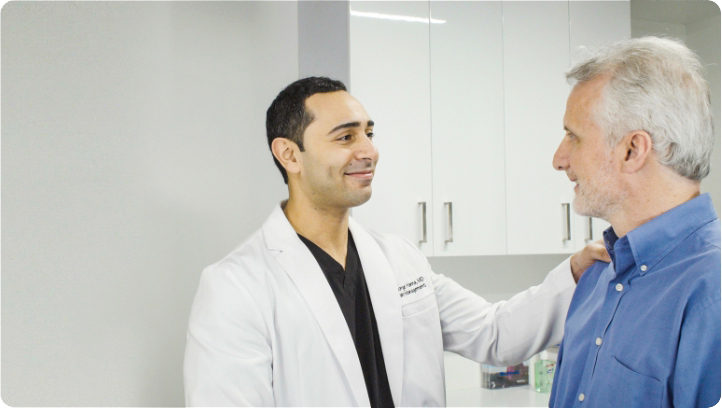What Is the Best Sciatica Pain Treatment
June 26, 2021
Non-surgical Sciatica Pain Treatments Recommended by Our Sciatica Specialists
If sciatica pain is bothering you, then you are probably experiencing a series of symptoms triggered by the inflammation of your sciatic nerve. In general, these symptoms begin in the lower back area, your buttocks, and down your leg. The pain associated with sciatica can be quite debilitating, so it’s recommended to book an appointment with a specialist who can offer sciatica pain treatment near you in New Jersey as soon as possible.
At Pain Treatment Specialists New Jersey, our dedicated team of pain management specialists utilizes a wide range of treatments for all problems that trigger sciatica pain, including lumbar herniated discs, lumbar spinal stenosis, degenerative disc disease and more.
If you schedule an appointment with Dr George Hanna, Dr Laura Lombardi, and Dr Shane Volney, you’ll get a customized treatment plan based on what’s causing your pain and the severity of your symptoms. The good news is that you might get better by making some lifestyle changes that will be recommended on your first appointment. If, however, that is not sufficient, our interventional pain specialists will offer effective non-surgical treatment options.
Read on to find out which treatments are the most effective non-surgical sciatica treatments and what our Harvard-trained back specialists recommend.

Home Treatments
For many people, sciatica is a manageable affliction that gets better after a few days of rest and home remedies such as rest, cold packs and hot packs, stretching, and over-the-counter medicine. If your pain is not severe and it doesn’t prevent you from carrying on with your daily activities, you should start by trying these basic solutions. Even if your pain isn’t debilitating, it is recommended to discuss it with one of our board-certified sciatica specialists to ensure that your pain will not worsen over time.
Physical Therapy
When it comes to sciatica, physical therapy aims to strengthen the muscles in your lower back, core, spine, buttocks, and hip. Stretching muscles that are too tight like the hamstring muscles can also provide pain relief. In addition to that, light aerobic exercises such as swimming and walking will promote the exchange of nutrients and fluids in your body.
Our experts emphasise that while it is important to avoid putting a lot of pressure on your back and avoid heavy lifting when you are suffering from sciatica pain. However, it is very important to avoid sitting in bed all day as this might make your pain worse. The best course of action is to maintain some activity and to avoid prolonged bed rest. To ensure that you’re performing the right exercises, it’s best to get a customized treatment plan from a trained health professional. A physical therapist can prevent you from injuring yourself during workouts.
Medication
In many cases, sciatica pain can be relieved effectively with over-the-counter medications. If the pain persists, our sciatica specialists might recommend prescription medications. The medications that are most commonly used for sciatica are ibuprofen, naproxen, and other non-steroidal anti-inflammatory drugs, tricyclic antidepressants, anti-convulsant medications, oral steroids such as prednisone, and in extreme cases opioid analgesics.
Steroid Injections
When the pain doesn’t go away with the aforementioned solutions, our sciatica specialists might recommend lumbar therapeutic injections. These injections are extremely effective for treating the pain triggered by conditions that are irritating the sciatic nerve. The main goal of steroid injections is to provide sufficient pain relief to enable to patient to participate in a physical therapy program without discomfort. Injections are also a diagnostic method and our sciatica doctors might use them to pinpoint the affected nerves and to find the source of the pain.
The most commonly-used injections used for treating sciatica pain are:
Epidural Steroid Injections – These injections provide effective pain relief if your suffering from one of the following conditions: degenerative disc disease, herniated discs, spinal stenosis, etc. The aim of epidural steroid injections is to reduce inflammation around the sciatic nerve and to inhibit the production of inflammatory cells, which is a natural response in your body.
Selective Nerve Root Blocks – Often referred to as a nerve block injection, this treatment can also be used to diagnose and alleviate sciatic nerve pain. This treatment consists of injecting an anaesthetic or a combination of anaesthetic and steroids in the bony opening between the adjacent vertebra, where the affected nerve exits the intervertebral foramen. The aim of selective nerve root block is to prevent certain enzymes to cause inflammation and pain, to prevent the pain signals from being transmitted to the brain, and decrease blood flow in the nerve fibres. Depending on your diagnosis, your sciatica doctor might decide to administer one or more such injections to relieve your pain as much as possible.
Alternative Therapies
In some cases, alternative therapies can be a solution for sciatica pain. Acupuncture, chiropractic therapy, and massage therapy are effective for some patients. If you are considering opting for alternative therapies, it is highly recommended to discuss with a board-certified sciatica specialist beforehand. These therapies might not have a negative impact on your overall health, but your sciatica pain might be linked to a more serious condition. It’s always good to know exactly what you are dealing with before making a decision that will impact your health.
Get In Touch
Now that you know what the most effective non-surgical treatment options are when it comes to sciatica pain, it’s time to take action. You can schedule an appointment online by filling out this quick form and checking your insurance coverage or you can send us an e-mail at info@vipmedicalgroup.com and one of our friendly staff members will contact you as soon as possible. Another way to get in touch with our sciatica specialists is by calling (855) 211-8568. We’re happy to offer information about our Harvard-trained back doctors, the treatments that they offer, and to answer any questions that you might have.
Don’t wait for your pain to worsen, book an appointment with Dr George Hanna, Dr Laura Lombardi, or Dr Shane J. Volney and get a customized non-surgical treatment plan. You can find us in Clifton, NJ, on Route 46 E, past the Ford dealership, in Paramus on Route 17, near the Paramus Park Mall, in West Orange, near the Essex Country Club, and in Woodland Park, on McBride Avenue.
Book a Consultation
Scheduling a consultation with one of our pain treatment specialists is one of the best ways to determine the proper solution for pain relief.
Meet Our Team of Back Pain Specialists
All of our Pain Doctors in New Jersey are Harvard Trained and Board Certified in Pain Management

Back Pain Doctor Clifton & West Orange NJ
Dr. George Hanna
Dr. Hanna is a Harvard Trained back specialist in New Jersey and New York. He serves as Medical Director of Pain Management.

Back Pain Doctor Clifton & West Orange NJ
Dr. Laura Lombardi
Dr. Lombardi is a Harvard Trained back pain treatment doctor, currently seeing patients in Clifton and West Orange, New Jersey.

Back Pain Doctor Clifton & West Orange NJ
Dr. Shane Volney
Dr. Volney is a Harvard Trained back treatment doctor seeing patients in the NJ areas of Clifton & West Orange, and in NYC.

Back Pain Doctor Clifton & West Orange NJ
Dr. Michael Nguyen
Dr. Nguyen is Harvard Trained and Board Certified in Pain Management. His pain center accepts major medical insurances and Medicare.

Dr. George Hanna

Dr. Laura Lombardi
Dr. Lombardi is a Harvard Trained back pain treatment doctor, currently seeing patients in Clifton and West Orange, and Paramus New Jersey.

Dr. Shane Volney
Dr. Volney is a Harvard Trained back treatment doctor seeing patients in the NJ areas of Clifton & West Orange, and in NYC.

Dr. Michael Nguyen
Dr. Nguyen is Harvard Trained and Board Certified in Pain Management. His pain center accepts major medical insurances and Medicare.
